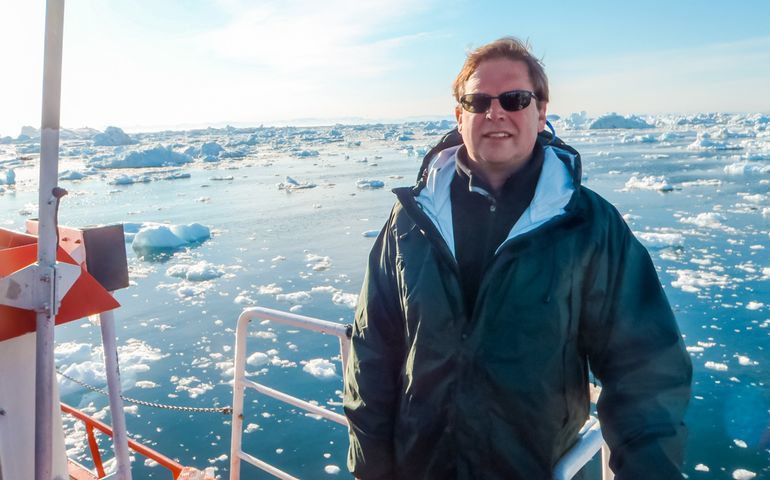Maine aquaculture leader steps onto national stage
 Courtesy / Maine Aquaculture Association
Sebastian Belle, appointed president of the board of the National Aquaculture Association, said Maine serves as a model for other states.
Courtesy / Maine Aquaculture Association
Sebastian Belle, appointed president of the board of the National Aquaculture Association, said Maine serves as a model for other states.
A leading voice in Maine’s aquaculture sector has been tapped to work on industry issues at the national level.
Sebastian Belle, executive director of the Maine Aquaculture Association, was named president of the board of directors of the National Aquaculture Association for the 2022 term.
“Maine is often viewed as a case study for how to ‘do things right’ in terms of balancing development with the interests of multiple stakeholders in public waters and how to protect the environment,” Belle told Mainebiz.
Last fall, the association released a set of occupational standards for marine farming — the first such benchmarks in the country — and a Maine Shellfish Aquaculture Career Pathways Map, designed to provide an overview of the most common job types, entry points and career pathway opportunities in Maine’s shellfish aquaculture sector.
Last month, the trade group released a go-to-market guide designed to help seafood farmers evaluate distribution channels for their products to best decide how to get them to market.
In January, the association and Maine Sea Grant, on behalf of the Maine Aquaculture Hub, released the Maine Aquaculture Roadmap 2022-32, a 10-year plan that proposes four major goals and identifies over $15 million in estimated resources needed to strengthen Maine’s aquaculture sector and working waterfronts.
And in 2020, the association released what it called a first-of-its-kind financial benchmarking report for the industry, as well as new planning and risk management tools for aquaculture businesses.
Model for others
Many of the best management practices and regulations developed and used by Maine’s aquaculture industry over time have been used and are being used as models at the national level, Belle said.
“We often get delegations from other states, countries and environmental organizations who come to Maine to see how we balance what may seem like competing interests and also how aquaculture is playing an increasingly important role in preserving working waterfronts,” he said.
The Maine Aquaculture Association, established in 1978 and headquartered in Hallowell, is a private nonprofit trade association representing Maine shellfish, finfish and seaweed farmers. Its mission is to support the state’s aquatic growers in developing economically and environmentally sustainable business practices, to promote the benefits of aquaculture in the local food system, and to preserve Maine’s heritage of a vibrant working waterfront. Maine’s aquaculture industry represents nearly 200 farms and more than 700 farmers.
The sector has been steadily growing in recent years, and its total economic impact has nearly tripled — from $50 million in 2007 to $137 million in 2014 — according to the latest Maine Aquaculture Economic Impact Report.
Over the past two years, Maine’s industry has experienced growth in retail and direct-to-consumer sales and in out-of-state markets.
The National Aquaculture Association, headquartered in Tallahassee, Fla., is a U.S. producer-based, nonprofit trade association founded in 1991 that supports the establishment of governmental programs that further the common interest of its membership.
Work conducted at the national level, said Belle, includes an aquatic animal health program, federal policy-making on aquaculture in federal waters, U.S. Department of Agriculture and U.S. Department of Commerce aquaculture regulations and development policies, and cross-species and production method issues.
Those are familiar issues for Maine's aquaculturists.
“All of those are relevant to Maine growers,” Belle said. “Another area in common is public education and social license issues.”
It’s likely that industry members in other states are looking at how Maine regulates its industry, said Afton Vigue, the association’s outreach and development specialist.
“Maine has a very unique permitting system which is rigorous yet fair,” Vigue said. “Our system has relatively low barriers to entry, meaning small businesses and independent entrepreneurs are not precluded from starting farms.”
The association has worked on the issues over the course of many years with the Maine Department of Marine Resources and coastal stakeholders, Vigue added.
“As demand for aquaculture products continues to rise, and other states look to improve existing or create new permitting systems, they are looking to Maine as an example of sustainable aquaculture development,” Vigue said.
Belle has been involved in the industry since 1984. Before joining the Maine Aquaculture Association in 1989, he was the state aquaculture coordinator, working for the Maine Department of Marine Resources.
In addition to his new board position, Belle serves on NOAA’s Marine Fisheries Advisory Committee and on the board of directors of the Maine Fishermen’s Forum, the Island Institute, and the Maine Aquaculture Innovation Center. He is also vice president of the International Salmon Farmers Association.
“Now more than ever aquaculture needs to unify as a sector to balance innovation with long-term sustainability,” said Belle. “Our seafood farm families, in Maine and across the nation, and working waterfront depend on it.”










0 Comments